Carla Carpio, Intern 2003-2004
Background Bio:
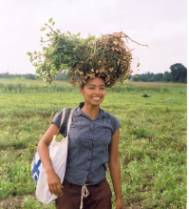 During university and for the past two and a half years after graduation,
I worked for two environmental consulting companies and an environmental
research laboratory managing project work for contaminated site assessments
and conducting research for an in-situ water treatment technology.
Understanding that the field of soil and groundwater remediation was
only a ‘patch-up' solution to today's environmental problems,
I began to search for opportunities where I could be more pro-active.
That's when I looked towards environmental preservation and enhancement,
and found out about CIDA Youth Internships and REAP-Canada.
During university and for the past two and a half years after graduation,
I worked for two environmental consulting companies and an environmental
research laboratory managing project work for contaminated site assessments
and conducting research for an in-situ water treatment technology.
Understanding that the field of soil and groundwater remediation was
only a ‘patch-up' solution to today's environmental problems,
I began to search for opportunities where I could be more pro-active.
That's when I looked towards environmental preservation and enhancement,
and found out about CIDA Youth Internships and REAP-Canada.
Education:
B.A.Sc. (Bio-Resource Engineering), University of British ColumbiaHost Country:
the GambiaInternship Experience:
Labib (the other intern) and I were the first REAP-Canada interns to work in the Gambia. Our job focused on working with the local NGO partners to identify communities who could most benefit from sustainable agriculture and network with local organizations who could support our programming. Since partnerships were just being developed and minimal information had been collected at that point, it was an exciting time to discover much about the Gambia.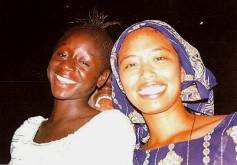 |
| Carla Carpio with host sister dressed for a traditional naming ceremony |
Living in the rural West Africa is no easy task - especially for women. I not only laboured with my host father cutting coos for hours in the hot sun, but as soon as I returned home I would help the women pound the coos, fetch buckets of water on our heads, search and haul firewood, and hand wash.
Especially during harvest season, everyone was busy from morning till night. Those simple two weeks helped me to understand what kind of pressures rural Gambians face on a daily basis. I started to realise how much work was involved for an income of less than a dollar a day, how little resources these people had to develop themselves, and how much they relied on each other and their farms each and every day just to survive. Despite these hardships, I was also lucky to feel the family closeness that arises from collectively working so hard and appreciate the amount of effort they are willing to give, working hard if not harder than us in the Western world, in spite of their poverty-level incomes.
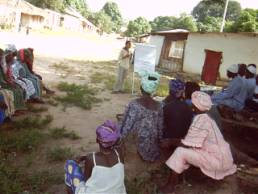 |
| Carla Carpio sensitizing local community members of the Agro-Ecological Village concept |
Understanding the Gambia's rural living conditions was essential to the development of the project. By realizing what their society's pressures and protocols were, the local partners and I were able to highlight which problems needed to be addressed in the AEV development project and conceptualize how community mobilization was going to tangibly work in this Gambian setting. Through this immersion I gained a variety of new skills including the ability to communicate cross-culturally, be sensitive to other cultures, and deal with environmental sustainability issues. These and many more have helped me in my personal and professional development; and the mere reflection of this experience will help me even more in the years to come.
To learn more about Carla’s experience, please click on the following link to view a short-film that she produced and directed herself: here
Labib El-Ali, Intern 2003-2004
Background Bio:
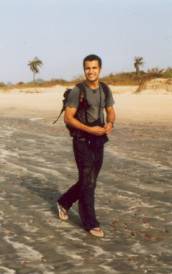 My education and professional experiences so far have been shaped by the two
complementary forces that continue to drive my learning and development, being
the desire to gain an unclouded understanding of the global community's interaction
with the earth and its systems, and the impulse to reflect on the ways in which
people interpret their own experience and what drives their actions. Defining
the links between these two forces is helping me find my role as an active member
of a movement to restore health and peace to the earth and its inhabitants.
My education and professional experiences so far have been shaped by the two
complementary forces that continue to drive my learning and development, being
the desire to gain an unclouded understanding of the global community's interaction
with the earth and its systems, and the impulse to reflect on the ways in which
people interpret their own experience and what drives their actions. Defining
the links between these two forces is helping me find my role as an active member
of a movement to restore health and peace to the earth and its inhabitants.
Education:
B.Sc. (Environmental Science), University of Calgary
Host Country:
the GambiaInternship Experience:
My first role as an intern was to gain as strong a familiarity as possible with REAP-Canada and our programming within the span of roughly six weeks, while working in the office in Ste. Anne-de-Bellevue. It was a hectic time that I can describe fairly as an overload of information and ideas on ecological farming and the life and struggle of farmers across the globe, which gave me a theoretical idea of what I was about to experience in The Gambia. The pre-departure activities in Victoria also brought the much welcomed company of fellow youth with similar views and passions. I was itching to make it overseas and begin.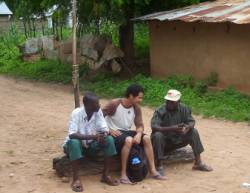 The
pace of life and work changed dramatically however as soon as I arrived in
The Gambia, and it was a worthy struggle adjusting to a culture and a way of
living that I hardly had the tools to interpret, even though I had been involved
in an overseas volunteer program not long before in Indonesia (2002). As my
hold on the language improved and my body adapted to its new environment, including
the food and water, so did my way of working and interpreting my surroundings.
It was an honor for me (and a good laugh for the women working alongside me)
to walk/swim my way to the rice fields and put in a solid days work transplanting
seedlings. Rumors of hippos, alligators, and snakes parading beneath the water
where I couldn't see gave me enough excuses to rest my aching legs and back.
Tough women out there in rural Gambia, walking ten kilometers and getting cooked
in the hot faro water for ten dalasi a day, which will get you a decent rice
bowl with peanut sauce (domoda) or a three loaves of bread.
The
pace of life and work changed dramatically however as soon as I arrived in
The Gambia, and it was a worthy struggle adjusting to a culture and a way of
living that I hardly had the tools to interpret, even though I had been involved
in an overseas volunteer program not long before in Indonesia (2002). As my
hold on the language improved and my body adapted to its new environment, including
the food and water, so did my way of working and interpreting my surroundings.
It was an honor for me (and a good laugh for the women working alongside me)
to walk/swim my way to the rice fields and put in a solid days work transplanting
seedlings. Rumors of hippos, alligators, and snakes parading beneath the water
where I couldn't see gave me enough excuses to rest my aching legs and back.
Tough women out there in rural Gambia, walking ten kilometers and getting cooked
in the hot faro water for ten dalasi a day, which will get you a decent rice
bowl with peanut sauce (domoda) or a three loaves of bread.
My host organization (Village Aid - The Gambia) was working to empower the women of Lower Saloum through literacy, paralegal, economic, and food security interventions, and I was privileged to learn from their experiences in working directly with some of the most marginalized people in the country. My cultural integration and frequent visits and stays in the communities developed my appreciation for the way of life of the common farmer and his and her struggle to sustain themselves from the land on which they were born and on which they continue to live, generations after their ancestors first arrived there. It was similar story across the country. My role as an intern began to shift towards project oriented tasks as the deadline for proposals was approaching and as REAP-Canada's director and project manager were beginning to involve myself and partner intern (Ms. Carla Carpio) more directly in project development activities.
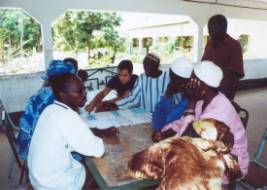 I
was lucky to have some time to visit Guinea, a short flight away, and be in
the natural beauty of the Futa Djalon. I got my fill of waterfalls (I needed
my fix after months in the parched landscape around Kaur!) and experienced
a completely different side of West Africa. Shortly after the REAP Project
Manager (Ms. Claudia Holem) arrived on-site and worked closely with me to introduce
the AEV model in The Gambia, working
alongside the National Agricultural Research Institute and Njawara Agricultural
Training Center.
I
was lucky to have some time to visit Guinea, a short flight away, and be in
the natural beauty of the Futa Djalon. I got my fill of waterfalls (I needed
my fix after months in the parched landscape around Kaur!) and experienced
a completely different side of West Africa. Shortly after the REAP Project
Manager (Ms. Claudia Holem) arrived on-site and worked closely with me to introduce
the AEV model in The Gambia, working
alongside the National Agricultural Research Institute and Njawara Agricultural
Training Center.
The most memorable moments of my internship however would have to be the last ones spent at the airport in Dakar. I was entertaining the outlandish possibility that a friend might arrive unexpectedly and offer to take me back to the community to continue a life there that I was just beginning to know. Luckily no one came, for I was just as willing to hop on a bush taxi back to Njawara as I was to take my seat in a plane headed for Casablanca. I realized then how much the experience, difficult and beautiful as it was, had warmed me to people who are as connected to the land on which they lived as the few trees that remain there, and struggle in equal proportion with those few trees to remain there and grow in good health and spirit. I am blessed to have been given this opportunity to direct my personal growth towards the betterment of rural communities and nature through ecological agricultural and sustainable community development.




